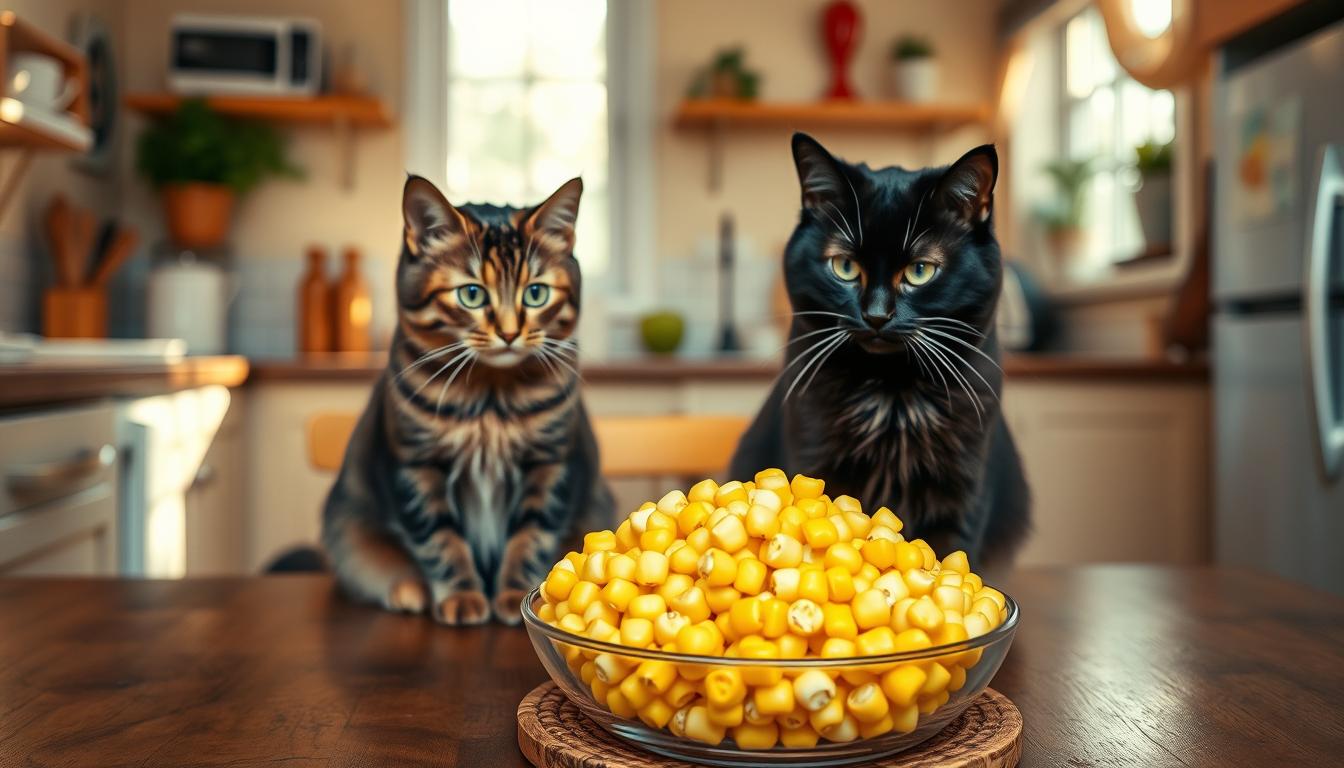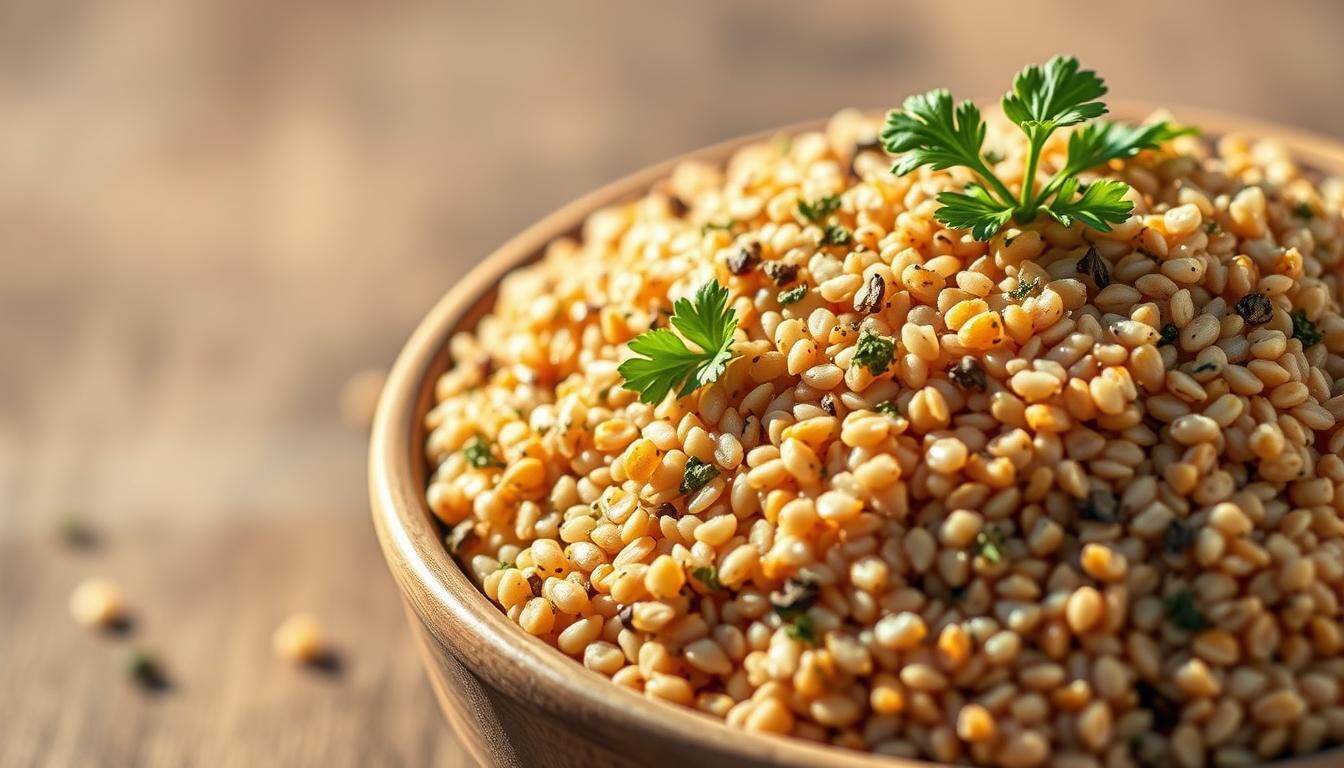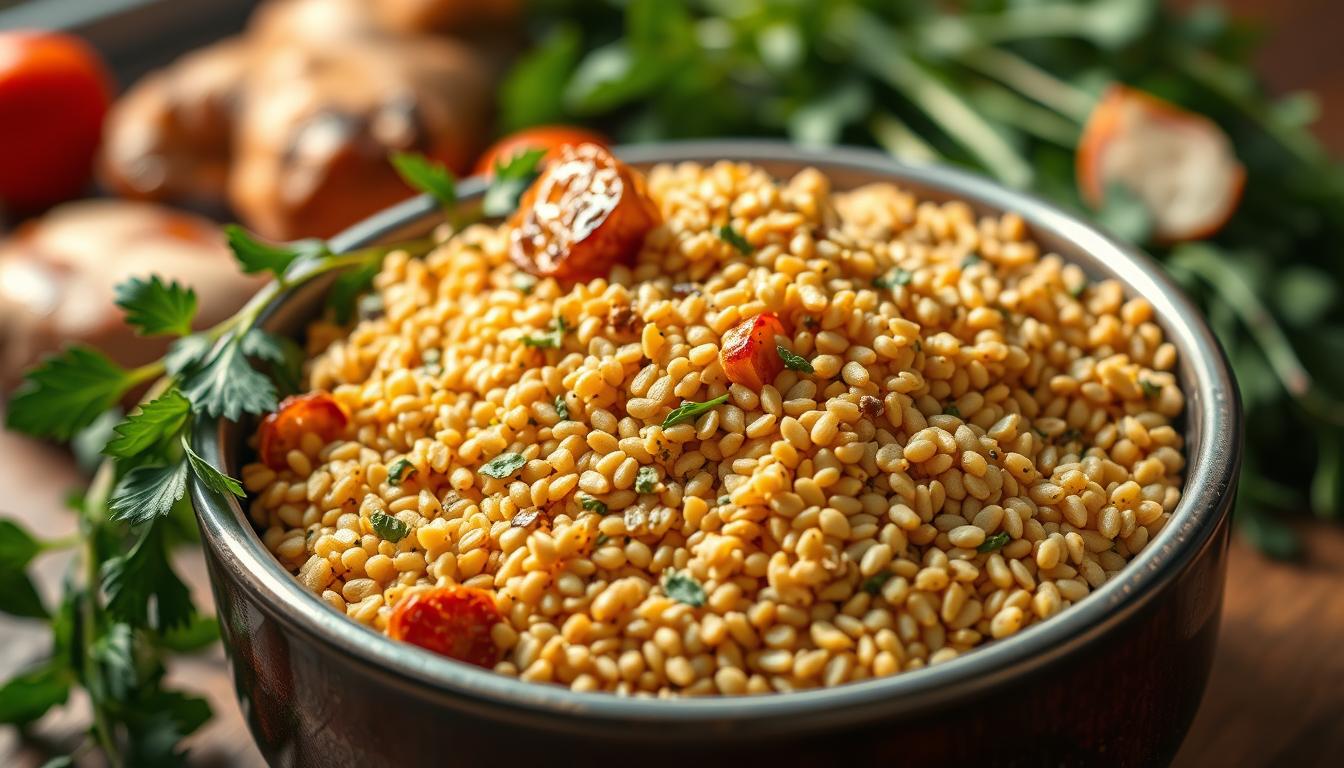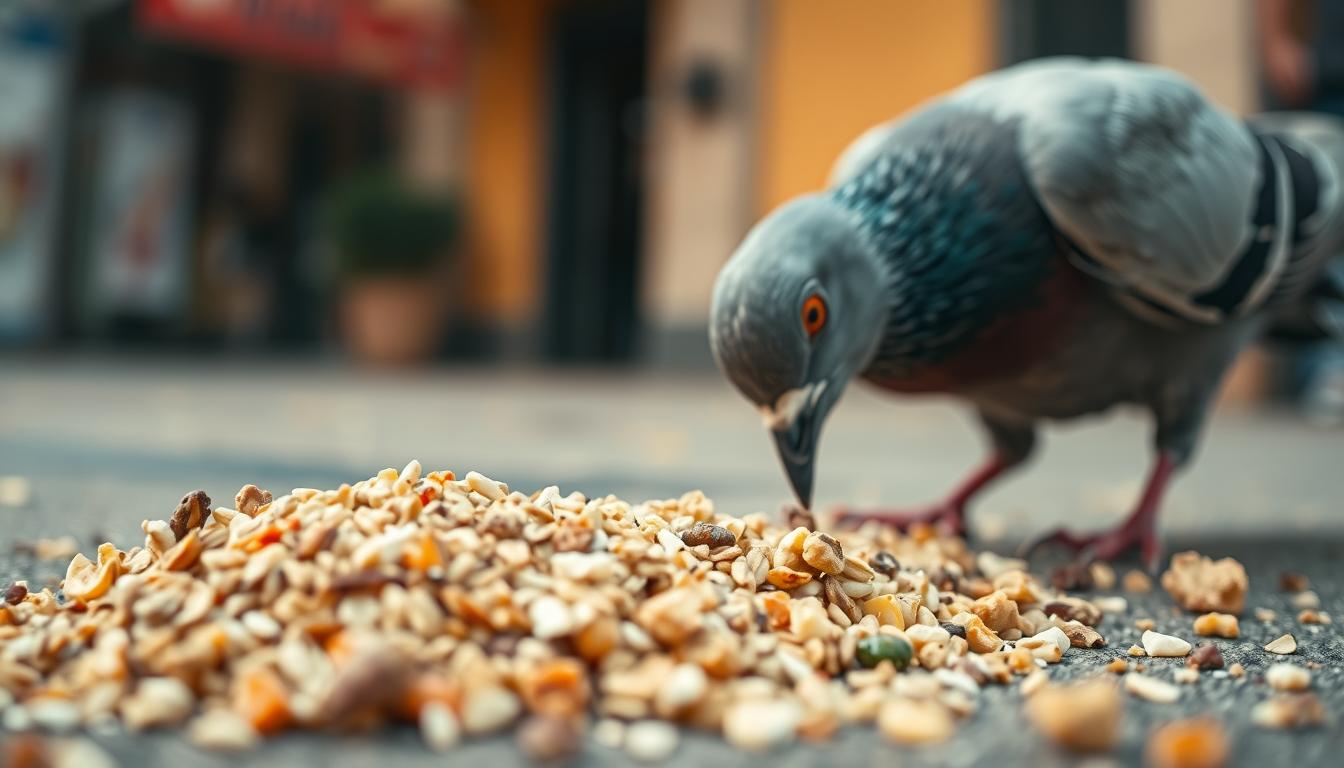Ever thought that a simple corn kernel could harm your cat? Many cat owners are shocked to learn about corn in cat diets. It’s a topic of debate in pet nutrition, with big implications for your cat’s health1.
About 15% to 30% of pet food includes corn, but most owners don’t know the risks1. While a little corn is okay, it shouldn’t be the main part of your cat’s diet1.
Cats need a lot of protein, but corn doesn’t offer much. It only adds 8% to 10% protein to their meals1.
So, is corn good for cats? It’s not that straightforward. A few kernels might be fine, but eating it regularly could cause health problems. High-carb diets might make cats gain up to 10% of their weight1.
In this article, we’ll explore eight surprising facts about cats and corn. Get ready to be amazed by what’s really in your cat’s food!
Table of Contents
1. Understanding Cats’ Digestive Systems
Cats have a special digestive system that makes them different from many animals. Their bodies are great at breaking down animal proteins2. Knowing how their digestive system works helps you choose the best food for them.
Cats: Pure Carnivores by Nature
Cats are strict carnivores by nature. Their digestive systems are made to handle meat-based proteins well2. So, giving them a corn diet needs careful thought, as they can’t digest plant-based foods easily.
The Complex Role of Grains in Feline Nutrition
Grains might seem confusing, but they offer some good nutrients. Corn, for example, gives cats important nutrients like:
- Iron
- Calcium
- B vitamins
It’s interesting that grain allergies in cats are very rare3. This shows that grains aren’t always bad for cats’ diets.
Digestive Processing and Corn Consumption
Cats have a short, acidic digestive tract that quickly breaks down proteins. When thinking about a corn diet for cats, remember their bodies don’t absorb plant nutrients as well as animal proteins2.
*”Nutrition is the cornerstone of feline health, and understanding your cat’s unique digestive system is key.”*
Always talk to a vet before changing your cat’s diet. This ensures they get the right food for their health3.
2. Nutritional Profile of Corn
Exploring corn’s nutritional value for cats is important. Pet owners need to know about feline nutrition. Corn is found in many cat foods, raising questions about its benefits and drawbacks4.
Vitamins and Minerals in Corn
Corn has nutrients that can help a cat’s diet. It includes carbohydrates, protein, and fiber for energy and body functions4. Key nutrients in corn are:
- Linoleic acid for skin and coat health
- Essential minerals
- Trace amounts of vitamins
Potential Benefits of Corn for Cats
Even though cats are meat-eaters, corn can still be beneficial. Studies show corn has nutrients that can add to a cat’s diet5. Many vet-approved cat foods use corn for its nutritional value6.
“Not all corn in cat food is harmful, but it shouldn’t be the primary protein source.”
Corn’s digestibility varies. It’s not as nutrient-rich as animal proteins, so cats might not get all the nutrients4. The important thing is to use it in moderation and know your cat’s diet needs5.
It’s interesting that food allergies to corn are rare, affecting less than 1.5% of cats6. This debunks myths about grain-based ingredients in cat food.
3. Is Corn Safe for Cats to Eat?
When thinking about corn for cats, owners need to look at risks and sensitivities. Cats are meat-eaters with special diet needs that are different from other pets7.
It’s important to understand corn safety for cats. While they can eat a little corn, it’s not a key part of their diet8.
Allergies and Sensitivities
Some cats might have allergies to corn. Look out for these signs:
- Digestive discomfort
- Skin irritations
- Unexplained lethargy
- Changes in appetite
Corn allergies are not common but can happen in cats8. About 70-80% of cat foods have corn or cornmeal, so many cats eat it often9.
Observing Your Cat’s Reaction
“Always monitor your cat’s response when introducing any new food into their diet”
If you’re wondering if cats can eat corn, here’s what to do:
- Start with very small amounts of corn
- Watch for any digestive issues right away
- Talk to your vet if you notice any problems
Remember, corn doesn’t offer much nutrition for cats and should not replace meat-based foods. Cats need more than 90% of their diet to come from animal proteins9.
4. The Debate: Corn in Cat Food
Pet food makers often talk about corn in cat food. Knowing the different views can help you choose the best for your cat.
Why Some Brands Include Corn
Some cat food brands use corn for good reasons. It’s cheap and helps mix the food together10. Corn also gives cats quick energy10.
- Affordable ingredient for pet food manufacturers
- Helps create consistent food texture
- Provides supplemental energy
Potential Drawbacks of Corn in Diet
But, corn in cat food has big nutritional worries. Cats need meat proteins, and corn might not give them enough11. Cats should eat mostly meat, not corn11.
“Cats need specific amino acids that are mainly found in meat, not grains” – Veterinary Nutritionist
Corn can be part of a cat’s diet, but it shouldn’t be the main protein. Grain-based diets can help with digestion if balanced right10. Cat food should have at least 30% protein and only 10-15% carbs from grains10.
When thinking about corn in cat food, talk to your vet. They can make sure your cat gets the right food for their health12.
5. Can Cats Digest Corn Properly?
It’s important to know how cats digest corn. Cats are mostly meat-eaters, but some cat foods have corn. This raises questions about its digestibility and nutritional value.
The Impact of Cooking on Digestibility
Cooking changes how cats digest corn. Raw corn is hard for cats to digest, but cooked corn is easier. Cooking breaks down complex carbohydrates, making nutrients easier for cats to absorb13.
- Raw corn remains largely undigested
- Cooked corn offers improved digestibility
- Heat treatment can enhance nutrient absorption
Whole Corn Vs. Processed Corn Products
Not all corn in cat food is the same. Whole corn is different from processed corn. Your cat’s diet might include:
- Whole corn kernels
- Corn meal
- Corn gluten
“Corn is found in many veterinarian-approved cat foods, providing nutritional value”6.
Processed corn is easier for cats to digest than whole kernels. Grain-based foods cause less than 1.5% of food allergies in cats6. This means corn can be safe for cats when prepared right.
Even though corn can be part of a cat’s diet, it should not replace animal proteins. Animal proteins are key for cats’ nutrition13.
6. Alternative Grains for Cats
Looking for cat-friendly corn products? Pet owners often want healthier grain options for their pets. Not all grains are the same, and some are better for your cat’s health14.
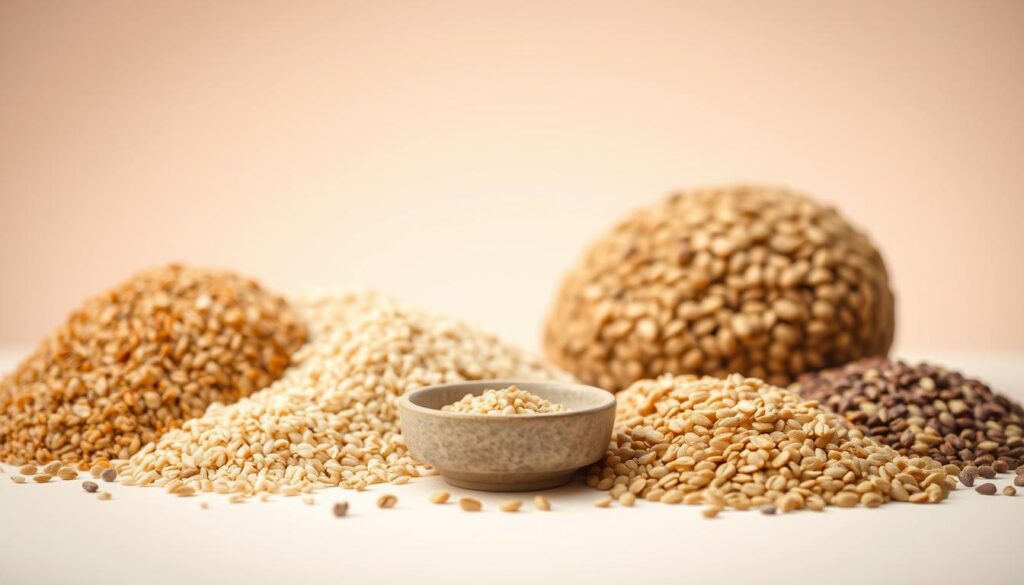
Finding the right grain for your cat can be tricky. Different grains have unique nutrients that can help your pet stay healthy14.
Rice: A Digestible Option
Brown rice is a good choice for cats instead of corn. It has many benefits:
- More protein than white rice14
- Full of minerals like manganese and selenium14
- Helps keep your cat’s diet balanced
Oats: A Nutrient-Dense Grain
Oats are a safe choice for cats. They offer great health benefits:
“Not all grains are harmful – some can actually provide valuable nutrients for your feline companion.”
Remember, every cat is different. Always talk to your vet before changing your cat’s diet15.
Some pet food brands are using these grains. Earth Animal and NutriSource are making cat food with better grains14.
7. Signs Your Cat May Have an Allergic Reaction
Understanding corn and cat health is key for pet owners. Cats can be allergic to many foods, including corn. This can lead to serious health issues.
Many cats have food allergies, which can last their whole lives1617. Spotting these signs early is vital. It helps keep your cat healthy and decides if corn is right for them.
Common Symptoms to Watch For
- Persistent skin irritations or unexplained rashes
- Excessive scratching or grooming
- Digestive disturbances like vomiting or diarrhea
- Sudden changes in appetite
- Ear infections or recurring ear problems
What to Do If Allergies Occur
If you think your cat has a corn allergy, here’s what to do:
- Consult your veterinarian immediately
- Consider an elimination diet trial lasting at least 8 weeks16
- Document your cat’s symptoms carefully
- Avoid introducing new treats or supplements during the diagnostic period
“Early detection and professional guidance are key to managing potential food allergies in cats.” – Veterinary Nutrition Experts
Food allergies can happen at any age, with some cats more prone than others17. Purebred and younger cats might be more likely to have food sensitivities. So, keep a close eye on them.
8. Expert Opinions on Feeding Corn to Cats
Veterinarians have different views on feeding corn to cats. They know cats need special food because of their unique needs.
Vets say corn isn’t bad for cats but it’s not very good for them either. Cats are obligate carnivores and need meat in their diet18. So, corn isn’t a big deal for cats.
Veterinarians’ Insights
- Corn can pass through a cat’s digestive system largely undigested18
- Potential risks include gastrointestinal irritation18
- Allergic reactions may manifest as skin irritations18
Nutritionists’ Perspectives
Nutrition experts worry about corn in cat food. Most U.S. corn is genetically engineered, which could be harmful19. Some research links it to health problems, like organ diseases19.
“Not all ingredients are created equal in feline nutrition” – Veterinary Nutrition Expert
If you’re thinking about adding corn to your cat’s diet, talk to a vet. They suggest only a little corn and make sure it doesn’t replace meat20.
Every cat is different. Watch how your cat reacts and work with experts to find the best food.
9. Homemade Cat Food: Corn or No Corn?
Making homemade cat food needs careful thought, like using corn as treats. Cats have special dietary needs that require careful planning21.

It’s important to know what your cat needs in their food. Cats are meat-eaters and need lots of animal protein21. Even though some corn products are safe for cats, they shouldn’t be the main part of their diet.
Recipe Tips for Balanced Nutrition
- Choose fresh meat without additives21
- Include small amounts of grains like brown rice21
- Consult a veterinary nutritionist before creating homemade recipes
- Monitor your cat’s reaction to new ingredients
Balancing Nutritional Needs
Your homemade cat food should be well-balanced. Here are some key things to consider:
- Protein: Cats need it for health21
- Healthy fats: Fish oil can make their skin and coat better21
- Limited corn: Use it sparingly, if at all
- Essential supplements like taurine22
Remember, about 35% of cats have dietary sensitivities, so introduce new ingredients carefully23.
Be careful with corn as treats. Some cats can handle a little, but it should never be the main protein source. Always put your cat’s meat-based nutritional needs first21.
Homemade cat food can be rewarding, saving money and strengthening your bond with your cat21. Just make sure it’s a complete meal that keeps them healthy.
10. Real-life Experiences from Cat Owners
Every cat owner has a special story about their pet’s diet. Experiences with corn in cat food are all over the map. Some pet parents have learned a lot about their cats’ needs and what they can’t handle.
Introducing corn to a cat’s diet has mixed results. Some cats do well, while others face problems. These real-life stories can guide you in deciding if cats can eat corn24.
Success Stories of Feeding Cats Corn
- Some owners saw better digestion with corn in their cat’s diet24
- Others noticed their cats had more energy after changing their diet
- Many pet parents like corn as a supplement in cat food25
Cautionary Tales: What to Avoid
Not every cat does well with corn in their food. Cat owners have shared some important warnings:
- Some cats got allergic reactions from corn25
- Too much corn can cause stomach problems
- Other cats ate less when corn was the main ingredient
“Always monitor your cat’s reaction when changing their diet” – Veterinary Nutrition Expert
Experts say to talk to a vet before changing your cat’s diet. Corn, being a complex carb, should be added carefully24. Remember, cats need meat more than carbs in their diet25.
Every cat is different. What works for one cat might not work for another with corn in their food26.
11. Conclusion: Is Corn a Good Addition?
Thinking about corn for cats needs careful thought. Every cat is different, with special needs for food27.
Key Takeaways About Corn in Cat Diets
What corn does for cats isn’t simple. Cats need a lot of animal protein in their diet. Corn can be okay in small amounts, but it can’t replace meat27.
- Corn can be digestible in processed forms
- Small quantities may not harm your cat
- Potential risks include digestive issues
Important Considerations for Feeding Corn
Too much corn can cause health problems. Cats might get upset stomachs, diarrhea, and gain too much weight from eating too much corn27.
Remember: Your cat’s individual health and dietary needs are paramount.
Final Recommendations
Always talk to a vet before changing your cat’s food. They can give advice that fits your cat’s health needs28.
- Prioritize high-quality animal protein
- Limit corn and carbohydrate intake
- Monitor your cat’s response to dietary changes
Ultimately, moderation and professional veterinary advice are key to maintaining your cat’s optimal health.
12. Additional Resources for Cat Nutrition
Exploring corn and cat health needs reliable sources. Your journey to understanding cat nutrition doesn’t end here. Professional vets and nutrition experts suggest several key resources. They help you make informed decisions about your cat’s diet, including corn29.
Organizations like the American Association of Feed Control Officials (AAFCO) offer important guidelines. Their statements help pet owners understand what cats need at different ages29. When looking into cat nutrition, check out scientific publications from vet schools and nutrition centers. They offer evidence-based insights into what cats need to eat.
Recommended Reading
Top vet nutritionists recommend academic journals and books on feline nutrition. Websites from reputable vet institutions have the latest on corn and cat health. Always talk to your vet for advice that fits your cat’s needs29.
Where to Find More Information
Online platforms like the Cornell Feline Health Center and vet association websites have detailed guides. Nutrition research databases and peer-reviewed journals offer deep scientific views on corn diets for cats. Remember, nutrition science keeps changing, so staying updated is crucial for your cat’s health30.
FAQ
Is corn safe for cats to eat?
Corn is not toxic to cats, but it’s not the best food for them. Cats need animal protein, not plant-based foods like corn. Small amounts might be okay, but it shouldn’t be a big part of their diet.
Why do commercial cat foods contain corn?
Corn is cheap and helps bind ingredients in cat food. It’s used to keep costs down. But, it’s not always the best choice for your cat’s health.
Can corn cause allergies in cats?
Yes, some cats can be allergic to corn. Signs include digestive problems, skin issues, and ear infections. If your cat shows these signs, see a vet right away.
How digestible is corn for cats?
Cats can’t digest corn well. Their bodies are made for meat, not plants. Even cooked corn doesn’t give them much nutrition.
Are there better grain alternatives to corn for cats?
Yes, grains like rice and oats might be better for cats. They might be easier to digest and more nutritious. But, talk to a vet before changing your cat’s diet.
How much corn is too much for a cat?
Cats should hardly eat any corn. It should make up less than 10% of their food. They need more protein than corn can provide.
What signs indicate my cat might not tolerate corn?
Look for signs like vomiting, diarrhea, and skin problems. Also, watch for excessive grooming, ear infections, and weight loss. These could mean your cat is allergic or can’t digest corn well.
Should I completely eliminate corn from my cat’s diet?
It’s not necessary to remove all corn, but focus on meat-based foods. If your cat’s food has corn, switch to something with more protein and less grains.
Source Links
- Food & Food Toppers – https://www.kinship.com/pet-nutrition/food-and-food-toppers
- People Foods Cats Can Eat – https://www.webmd.com/pets/cats/ss/slideshow-people-foods-cats-can-eat
- What’s in My Cat’s Food?: Designer Diets, Grain Free Diets | VCA | VCA Animal Hospitals – https://vcahospitals.com/know-your-pet/whats-in-my-cats-food-designer-diets-grain-free-diets
- Is Corn Right for Your Pet? Here’s What You Need to Know. – Harlow Blend – https://harlowblend.com/is-corn-right-for-your-pet-heres-what-you-need-to-know/
- A Guide to Optimal Pet Nutrition: What to Feed Your Furry Friend – Animal Hospital of West Woodstock – https://www.animalhospitalofwestwoodstock.com/blog/a-guide-to-optimal-pet-nutrition-what-to-feed-your-furry-friend/
- Can Cats Eat Corn? | Great Pet Care – https://www.greatpetcare.com/cat-nutrition/can-cats-eat-corn/
- Can Cats Eat Corn? Vet-Approved Nutritional Facts & FAQ – Catster – https://www.catster.com/nutrition/can-cats-eat-corn/
- Can Cats Eat Corn on the Cob? – https://vocal.media/petlife/can-cats-eat-corn-on-the-cob
- Can Cats Eat Corn? Vet Reviewed Nutrition Facts | PangoVet – https://pangovet.com/pet-nutrition/cats/can-cats-eat-corn/
- Going Against The Grain: The Benefits Of Grain-Inclusive Cat Food | Cat Boarding Hotel Laguna, Mission Viejo, Anaheim, Santa Ana, CA | Cats Luv Us – https://www.catsluvus.com/cat-grooming/cat-food-with-grain/?srsltid=AfmBOopJT8rZAkuIiko76KuyS97sFNFlL2_FKI0ZRnAv3bI3DimrU3KQ
- Vegan Cat Food: Safe For Cats Or A (Non)Meaty Mess? – https://www.sustainablejungle.com/vegan-cat-food/
- Picking the Perfect Food for Picky Felines – https://www.thesprucepets.com/how-to-pick-cat-food-8696055
- Cat owner discovers corn has been eaten—culprit quickly reveals himself – https://www.newsweek.com/cat-owner-discovers-corn-has-been-eaten-culprit-quickly-reveals-himself-1999066
- Healthy grains for dogs and cats | Animal Wellness Magazine – https://animalwellnessmagazine.com/healthy-grains-for-dogs-and-cats/
- Homemade Diets for Cats and Dogs | Little Big Cat – Dr. Jean Hofve – https://littlebigcat.com/easy-homemade-diets-for-cats-and-dogs/
- Food Allergies in Cats: Does My Cat Have Food Allergies? – https://www.medvet.com/food-allergy-cat/
- Cat Allergies: Types and Symptoms – https://www.petmd.com/cat/conditions/systemic/allergies-cats
- Corn Is Not Toxic To Cats – https://greg.app/corn-toxic-to-cats/
- Why Is Corn Not Recommended for Pets? – https://www.barkandwhiskers.com/2022-04-22-why-you-shouldnt-feed-pet-food-containing-corn-to-your-pets/
- Human Food for Cats: What Can Cats Eat? – https://www.worldsbestcatlitter.com/blog/human-food-for-cats-a-basic-guide/
- DIY Cat Food Recipes: Homemade Meals for Your Feline’s Health – https://drpashu.com/5-homemade-diy-cat-food-recipes-for-health/
- 9 Homemade Cat Food Recipes (Vet Approved) – Catster – https://www.catster.com/nutrition/cat-food-recipes/
- What can I feed my cat when I’ve run out of cat food? – https://www.animalfriends.co.uk/cat/cat-advice/cat-food-and-diet/what-to-feed-when-out-of-pet-food/
- Cat Care 101: 7 Essential Tips Every Cat Owner Should Know – Astro Loyalty – https://www.astroloyalty.com/essential-tips-for-cat-owners/
- 4 Things to Avoid Feeding Your Cat | PrettyLitter – https://www.prettylitter.com/blog/4-things-to-avoid-feeding-your-cat?srsltid=AfmBOooauojFJ9wKz-SdHc-7cjfIBGC5ecPwHtBwjMzocr5Xfl1XM1is
- 10 Tips for a Happy & Healthy Cat! – https://petpals.com/news/10-tips-for-a-healthy-and-happy-cat/
- Can Cats Eat Cornstarch? Health Risks & Advice – Catster – https://www.catster.com/nutrition/can-cats-eat-cornstarch/
- Can Cats Eat Grits? | Cat Boarding Hotel Laguna, Mission Viejo, Anaheim, Santa Ana, CA | Cats Luv Us – https://www.catsluvus.com/cat-grooming/can-cats-eat-grits/?srsltid=AfmBOori-hSsK0A_ZhSswWErIpPDpwaVA28JNcV5J0kEsjVbba5o4bh2
- What’s in My Cat’s Food?: Designer Diets, Grain Free Diets | VCA | VCA Animal Hospitals – https://vcacanada.com/know-your-pet/whats-in-my-cats-food-designer-diets-grain-free-diets
- How Much To Feed a Cat – https://www.petmd.com/cat/nutrition/how-much-to-feed-a-cat

